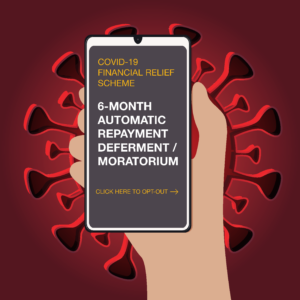
On April 20, 2020, Governor Baker signed Housing Bill 4647 (“House Bill”) into law. The Housing Bill provides for a moratorium (“Moratorium”) on evictions and foreclosures during the COVID-19 pandemic (i.e., a temporary prohibition on evictions and foreclosure). The Moratorium has a severe impact on landlords and mortgage holders. The experienced attorneys at Goldman & Pease have carefully analyzed the Housing Bill and offer you pertinent information to assist you during this difficult time.
When Does the Moratorium Expire?
The Moratorium is currently in effect and will expire the sooner of:
- August 18, 2020 (120 days after the date of the Housing Bill); or
- 45 days after the COVID-19 emergency declaration has been lifted.
The Governor has the ability to extend the Moratorium for periods of not more than 90 days. However, the Moratorium cannot be extended for more than 45 days after the COVID-19 emergency declaration has been lifted.
How Does the Moratorium Impact Landlords?
The Moratorium prohibits any non-essential residential evictions. Section 1 of the Housing Bill defines non-essential residential eviction to be:
- nonpayment of rent;
- resulting from a foreclosure;
- no fault / no cause;
- cause that is not based on:
- (i) criminal activity; or
- (ii) lease violations that may impact the health or safety of other residents, health care workers, emergency personnel, persons lawfully on the premises, or the general public;
A landlord dealing with a non-essential eviction is prohibited from terminating a tenancy or sending any notice, including a notice to quit, requesting or demanding that a tenant vacate the premises. As such, during the Moratorium, a landlord cannot take steps to terminate a tenancy for a tenant-at-will, a tenant who is refusing to pay rent, or any activity which does not endanger the health or safety of other persons.
 While landlords are not allowed to serve a notice to quit for nonpayment of rent during the Moratorium, landlords may (and are encouraged) to send past due notices (“Late Notices”) to tenants late on rental payments. This puts your tenants on notice of the late payment, allows landlords to document such late payment, and can be introduced as evidence in the event the matter proceeds to trial after the Moratorium.
While landlords are not allowed to serve a notice to quit for nonpayment of rent during the Moratorium, landlords may (and are encouraged) to send past due notices (“Late Notices”) to tenants late on rental payments. This puts your tenants on notice of the late payment, allows landlords to document such late payment, and can be introduced as evidence in the event the matter proceeds to trial after the Moratorium.
Specific language must be included in the Late Notices. The Executive Office of Housing and Economic Development enacted Emergency Regulations requiring all Late Notices to contain the following language in a clear and conspicuous manner:
THIS IS NOT A NOTICE TO QUIT. YOU ARE NOT BEING EVICTED, AND YOU DO NOT HAVE TO LEAVE YOUR HOME. An emergency law temporarily protects tenants from eviction during the COVID-19 emergency. The purpose of this notice is to make sure you understand the amount of rent you owe to your landlord.
For information about resources that may help you pay your rent, you can contact your regional Housing Consumer Education Center. For a list of agencies, see https://www.masshousinginfo.org/regional-agencies. Additional information about resources for tenants is available at https://www.mhp.net/news/2020/resources-for-tenants-during-covid-19-pandemic.
You will not be subject to late fees or a negative report to a credit bureau if you certify to your landlord in writing within 30 days from the missed payment that your non-payment of rent is due to a financial impact from COVID-19. If possible, you should use the approved form at: https://www.mass.gov/lists/moratorium-on-evictions-and-foreclosures-forms-and-other-resources. If you cannot access the form on this website, you can ask your landlord to provide the form to you. You may also send a letter or email so long as it contains a detailed explanation of your household loss in income or increase in expenses due to COVID-19.
This language must be listed on the first page of Late Notices, and should be no smaller than 12-point font.
While the Housing Bill allows “essential evictions” to proceed, the facts giving rise to the eviction must be carefully analyzed and articulated. Proper notices under any written lease must be provided to ensure compliance with the Housing Bill.
If you find yourself dealing with an essential or non-essential eviction, our attorneys are here to assist and guide you through this unprecedented time.
Commercial Evictions
The Moratorium also applies to certain commercial businesses. While prior orders have not specifically addressed commercial evictions, the Housing Bill defines which commercial businesses are covered. The Housing Bill applies only to commercial tenants who are small businesses. The legislature defines “Small business premises unit” (“Small Business”) to be a premise occupied by a commercial tenant, either for-profit or not-for-profit.
If your commercial tenant operates multi-state, multi-nationally, is publicly traded, or has more than 150 full-time employees, the tenant is NOT considered to be a Small Business and, therefore, is not protected by the Moratorium.
If your commercial tenant does not meet any of these criteria, then it is considered to be a Small Business and is afforded the same rights as a residential tenant under the Housing Bill.
A landlord can proceed with an eviction for a Small Business tenant if the tenant breached its lease or if the lease term expired PRIOR to the declaration of the COVID-19 emergency. This means if the Small Business tenant’s lease expired prior to March 10, 2020 or if the tenant breached its lease prior to such date, then a landlord is allowed to proceed as an “essential eviction.”
Residential and Commercial Evictions
Landlords of residential tenants and Small Business tenants are prohibited from imposing a late fee for non-payment of rent and reporting late payments to a consumer reporting agency only if a tenant provides notice and documentation within 30 days after the missed payment that the non-payment was due to financial hardship relating to COVID-19.
It is important to note that the Housing Bill explicitly sets forth that tenants are not relieved of their obligation to tender payment for rent.
The Courts
The Housing Bill includes explicit language which forbids any court having jurisdiction over a summary process action from accepting a writ or summons and complaint for filing. Courts are not allowed to schedule any court event including a summary process trial. In addition, no Court can enter judgment or default judgment nor can they issue an execution for possession. All deadlines for action are tolled under this Moratorium.
If you are in possession of an execution for possession, the expiration of the execution will be extended. Also, no sheriff, deputy sheriff, or constable is allowed to levy upon an execution for possession for non-essential evictions.
Using Last Month’s Rent
A landlord is allowed to access and utilize any last month’s rental payment which a landlord is holding to pay for expenses including mortgage payments, utilities, repairs, and required upkeep. A landlord is not allowed to access a last month’s rental payment to account any nonpayment of rent by a tenant. A landlord who chooses to access these funds to pay for expenses must notify the tenant in writing that the funds are being utilized and the last month’s rent payment will still be applied to a tenant’s last month, and the tenant is still entitled to interest pursuant to M.G.L. c. 186, §15B.
The Housing Bill has vastly changed how landlords can approach evictions. During this trying time, our office is here to assist you in your needs and available to provide diligent, conscientious, and zealous legal services.
Goldman & Pease is a full-service civil litigation firm which, for over thirty-five years, regularly advises and represents residential and commercial property owners, condominium boards, property managers, lending institutions, developers, and contractors on best practices and liability reduction measures
Goldman & Pease LLC, 160 Gould Street, Needham, Mass. 02494 (781) 292-1080.

